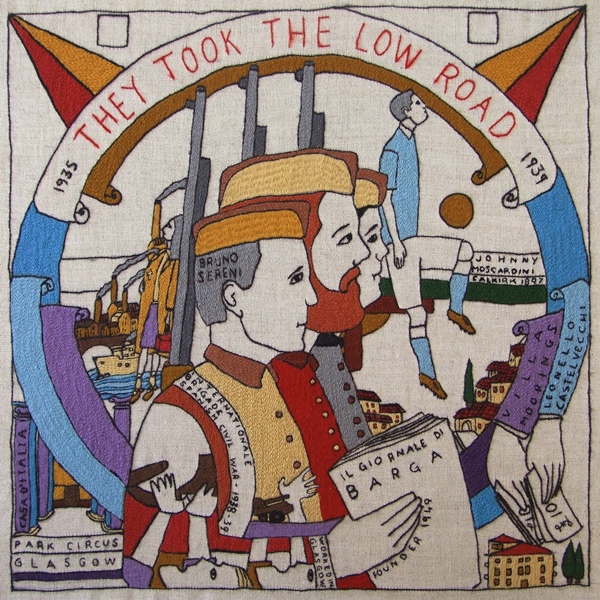
Stitchers: Ornella Bianciardi, Anna Biondi & Antonella Nartinelli
Bruno Sereni spent four years as a teenager working in the restaurant business in Glasgow. He joined the Internationale Brigade during the Spanish Civil War, 1938/9 and founded the Barga newspaper, Il Giornale di Barga in 1949. It was “the independent voice of unity with the people of Barga abroad”. (They Took the Low Road). Bruno’s son Umberto was the Mayor of Barga before the current mayor. He took part in the signing ceremony for the Twinning Agreement between Prestonpans, Cockenzie, Port Seton and Longniddry and Barga. A memorial to those ‘panners’ who fell with the Internationale Brigade can be found in Prestonpans.
The Casa d’Italia was situated at Park Circus in Glasgow and was initially the Italian consulate. This Italian social club lasted from 1940 to 1989 and it was there that marriage partners were often found. It no longer exists.
Giovanni ‘Johnny’ Moscardini a“Bargo Scozzesi” (1897 – 1985) was born in Falkirk and fought for Italy during WW1. He moved to Barga after the war and played with the “Lucchese” football team and then the Pisa team in the Premier League. Later in his career he played for the Italian National Team as well as other Italian clubs. The football stadium in Barga is named the Johnny Moscardini Football Stadium. He finally retired to Prestwick in Scotland.
The migrants lived extremely frugally and in crowded conditions in Scotland, sending money ‘home’ to pay for family members to join them and also to buy land outside the old town where many of them had come from. Building a villa was a sign of success and prestige. Leonello Castelvecchi’s ‘Villa Moorings’(built 1924) is an excellent testimony to the success of a Barga migrant and is named after ‘The Moorings’, the restaurant in Largs, Ayrshire.
Italian language, culture and education were maintained with visits ‘home’ and children from the same family were often born in either Barga or Scotland. If a parent was unable to make the trip to Barga, children often joined other families in visits back to Barga. These children would have name labels sewn into their clothes and little medals of patron saints to protect them. Carlo Zambonini tells how “half the children would spend time in Barga and the other in Scotland and they would be swopped around.” (from interview in Barga) Migration to Scotland from Barga almost stopped entirely after WW1. The only other spate of migration was for a brief period in 1952, when foresters and farmers from Barga moved over to work on the Duke of Argyll’s estate in Inverary. The Duke had approached the Barga authorities looking for expert foresters. (Bruno Sereni, They took the Low road).
 IT03 Ghabh iad an Rathad Ìosal
IT03 Ghabh iad an Rathad Ìosal
Chuir Bruno Sereni ceithir bliadhna seachad mar dheugaire ann an Glaschu mus deach e don Bhragàd Eadar-nàiseanta ann an Cogadh Catharra na Spàinne. Chuir e am pàipear-naidheachd Il Giornale di Barga air bhonn ann an 1949. Thàinig Umberto, mac Bhruno, gu bhith na Àrd-Bhàillidh air Barga agus bha e a’ coimhead thairis air a chàraideadh le Prestonpans, Cùil Choinnich, Port Seton agus Longniddry. Tha cuimhneachan do na h-Albannaich ionadail a bha a’ sabaid leis a’ Bhragàd Eadar-nàiseanta ri fhaicinn ann am Prestonpans. Rugadh an cluicheadair ball-coise, Giovanni ‘Seonaidh’ Moscardini (1897–1985) anns an Eaglais Bhric agus bha e a’ sabaid don Eadailt anns a’ Chiad Chogadh Mòr. Ghluais e gu Barga agus bha e a’ cluich do sgioba nàiseanta na h-Eadailt mus do ghluais e air ais a dh’Alba nuair a leig e dheth a dhreuchd. Tha lann-cluiche Bharga air ainmeachadh às a dhèidh.
